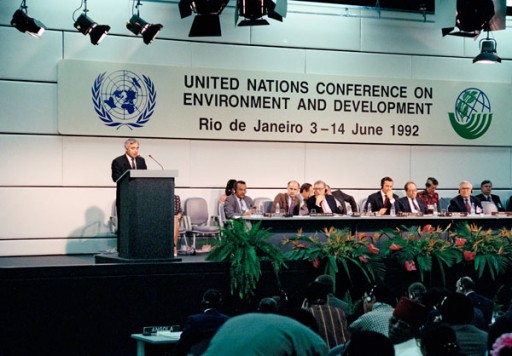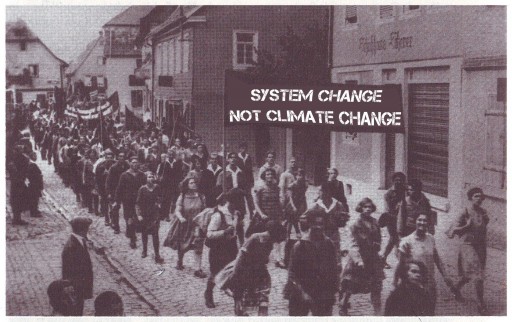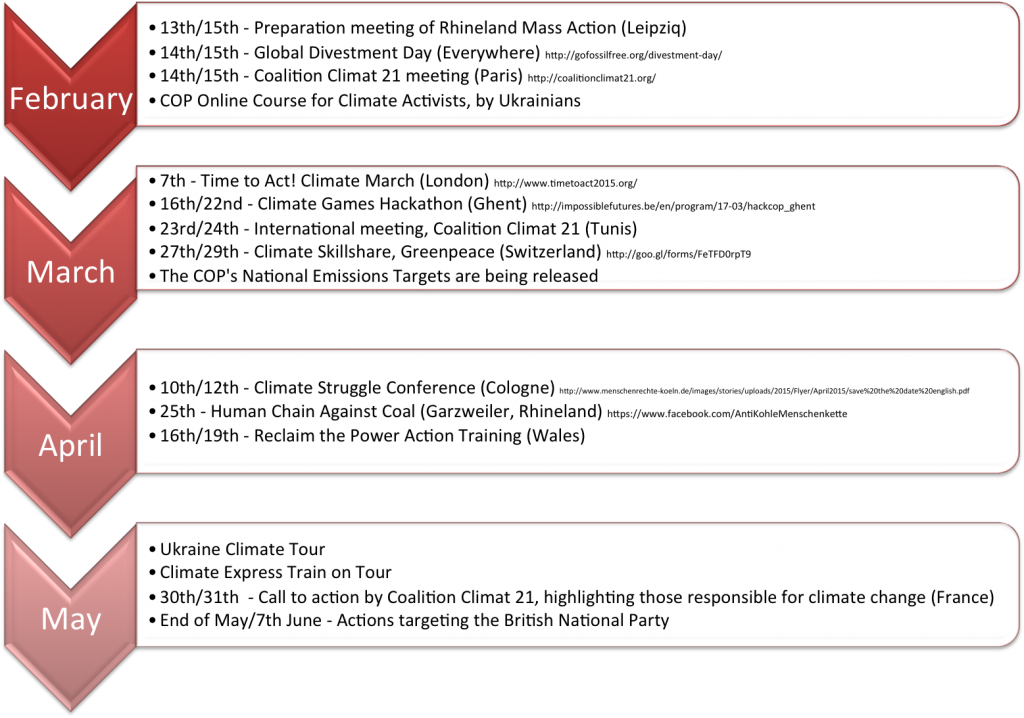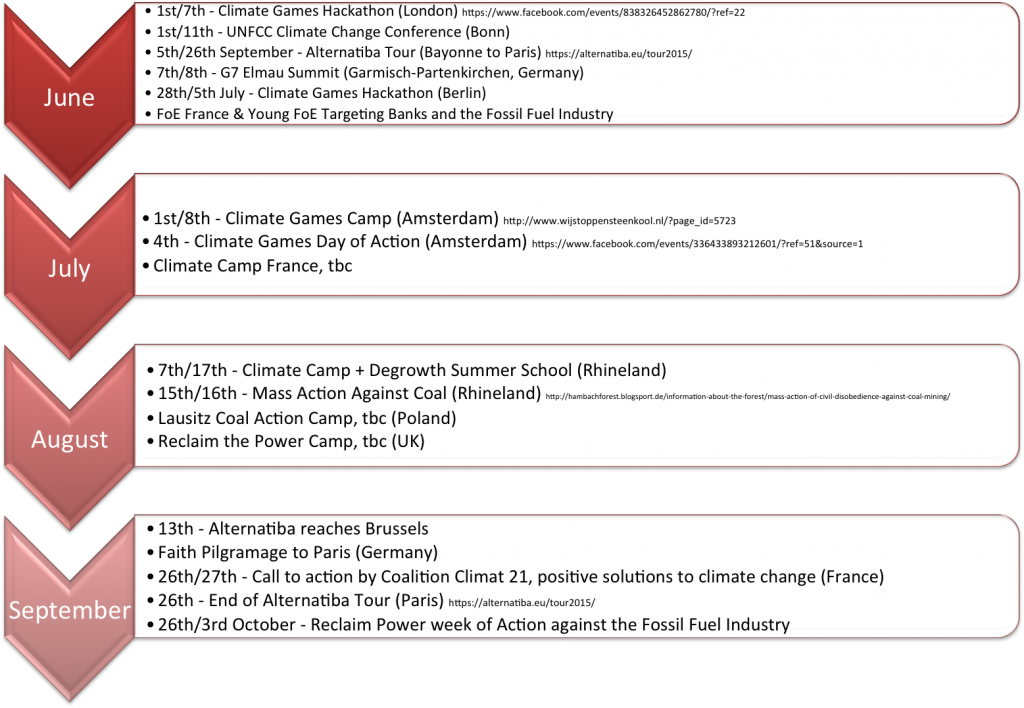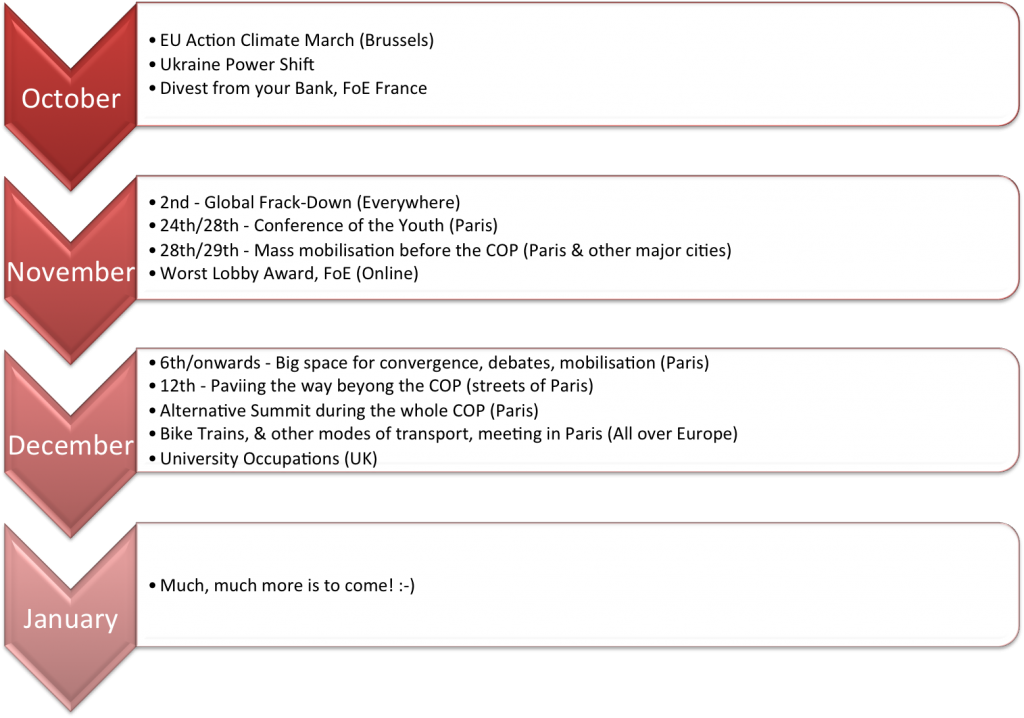From 30 November to 11 December IYNF will join the Climate Movement in the streets of Paris, where the COP21 will take place. Join us & make climate change history!
- The UNFCCC does not know how to party
The United Nations Framework Convention on Climate Change (UNFCCC) serves as a climate treaty with the goal to bundle international efforts and collaborations to tackle climate change. In 1992 there were 154 countries who signed the convention in order to: “stabilize greenhouse gas concentrations in the atmosphere at a level that would prevent dangerous anthropogenic interference with the climate system”.
That is what the UNFCCC is emphasising as their main mission. Today 23 years after the foundation of the UNFCCC, not many things have changed except for the fact that the urgency to tackle this global problem has increased drastically. Two decades ago the major criticism on the UNFCCC was that the treaty was voluntary with non-binding goals, which means that the countries were not obligated to achieve the goals of the treaty.
Imagine you’re organizing a party together with 154 friends. You all agree that everybody will bring some materials, some music, food & drinks and decorations to make the party spectacular and memorable. But, when the party was supposed to start, it is obvious that everybody expected the other to do any effort. In the end the party was a big fiasco. That is how the UNFCCC was working in the beginning.
In 1995, three years after the establishment of the UNFCCC, they organized for the first time a ‘Conference Of the Parties’ (COP). On these yearly assemblies the UNFCCC evaluates the previous contracts and discuss new motions. For the majority of the participating countries it was morethan obvious that the non-binding obligations were not enough.A couple of Conferences later, there was the first attempt in history to create a global binding climate treaty: the famous Kyoto-protocol. The main focus of this COP3 was to strengthen the treaty by legally imposing bindingtargets for individual member states.
In other words, when organizing the party, all of the participants agree that you have to bring your share in order to get access.
- Lack of ambition?
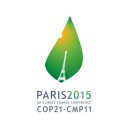 Meanwhile 20 COP’s later, the attempts to reduce the (global) emissions are not consistent with the urgency that the scientist community of the ‘Intergovernmental Panel on Climate Change (IPCC) is trying to explain to us. The longer we wait to reduce our emissions, the more severe the risks will be in the future – in particular for the global south. Currently the various actors of the COP are trying to create a draft for a global agreement that has to be ready by the end of this year. This is a very difficult process, such as the last COP in Lima has shown – mainly becauseevery country is following his own (economical) agenda.
Meanwhile 20 COP’s later, the attempts to reduce the (global) emissions are not consistent with the urgency that the scientist community of the ‘Intergovernmental Panel on Climate Change (IPCC) is trying to explain to us. The longer we wait to reduce our emissions, the more severe the risks will be in the future – in particular for the global south. Currently the various actors of the COP are trying to create a draft for a global agreement that has to be ready by the end of this year. This is a very difficult process, such as the last COP in Lima has shown – mainly becauseevery country is following his own (economical) agenda.
The problem of climate change is complex and it forces countries to look further than their own borders. Because it is a global problem, countries & nations are compelled to cooperate if they want to reduce the negative effects of the rising temperature. Climate change increases the chance on global poverty, hunger & mass migration and therefor increases possible conflicts. There are efforts being made to reduce the green-house gases, but according the scientist of the IPCC it is not enough to keep the global temperature below ‘the acceptable scale’. We need a more ambitious approach, and preferably today and not tomorrow.
- Join us!
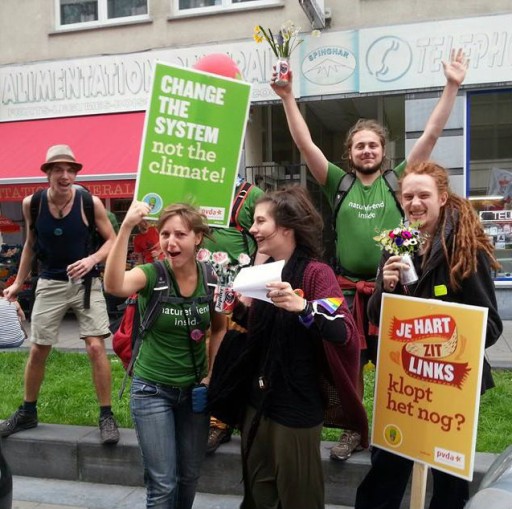 From 30 November to 11 December the 21st COP takes place in Paris. The negotiators of the represented countries promised us to have a binding climate agreement by the end of 2015, which will be put into practice in 2020. A lot of worried citizens, activists, NGO’s, human rights & grassroot organisations and the social and climate justice movements are tired of the lack of concrete plans – IYNF included. They share the worried feeling of the scientist community of the IPCC and demand a legally binding, social & climate just agreement that stimulates countries & nations to take (ambitious) steps and concrete actions. To support this demand, a lot of organisations are trying to mobilize people towards Paris to unite the call for action. By putting pressure on politicians and negotiators, we urge countries to come up with a realistic plan to decrease our global emissions. Many ideas that are nowadays completely normal to us – such as the eight-hour workday, environmental protection and a subsidized health care system – have been achieved by mass mobilisation.
From 30 November to 11 December the 21st COP takes place in Paris. The negotiators of the represented countries promised us to have a binding climate agreement by the end of 2015, which will be put into practice in 2020. A lot of worried citizens, activists, NGO’s, human rights & grassroot organisations and the social and climate justice movements are tired of the lack of concrete plans – IYNF included. They share the worried feeling of the scientist community of the IPCC and demand a legally binding, social & climate just agreement that stimulates countries & nations to take (ambitious) steps and concrete actions. To support this demand, a lot of organisations are trying to mobilize people towards Paris to unite the call for action. By putting pressure on politicians and negotiators, we urge countries to come up with a realistic plan to decrease our global emissions. Many ideas that are nowadays completely normal to us – such as the eight-hour workday, environmental protection and a subsidized health care system – have been achieved by mass mobilisation.
With IYNF we’re planning to go to Paris during the full period of the COP21. More updates will follow later. In case you’re already getting excited, there is no need to wait until Paris. See the list below for all initiatives from various (grassroots) organisations all over Europe.
- Save the world?
You may be wondering: ‘How can I influence the decision-making process on the streets without being part of the UNFCCC? If I’m there or not, what will it change?’ or ‘’Will our presence at the COP21 change a lot?’ Will you save the world by going to the COP21? No, absolutely not. But, you will be part of a growing movement, a growing community that cares for our planet. You will be part of a movement that is ready to change but that is not getting enough support from national governments and not enough incentives to adapt their behaviour to the new challenge of the world. You’ll have the chance to ‘be the change you want to see in this world’. And you’ll be there with friends! With true Naturefriends!
IYNF hopes to see you in Paris! For more information: mail thomas@iynf.org

